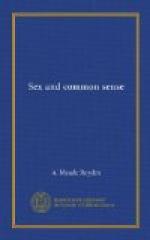[Footnote B: The italics are mine.—A.M.R.]
Even so is it with human love. These nomads of the affections give and take so little as they pass from hand to hand that they become cheap and have little left to give at last: nor do they really get what they would take. Men and women claim the right to “experience,” but experience of what? We do not live by bread alone, and the physical experience is not really all we seek. It is something, however? Yes—certainly something: but by a paradox familiar enough in human affairs, to snatch the lesser is to sacrifice the greater. The experimental lover, the giver whose small and careful gift is for a time, claims in the name of “experience,” of the “fulfilment of his nature,” what really belongs only to a greater giving. Such lovers are like a rich man who sets out tramping with nothing in his pocket. He may suffer temporary inconvenience, but is within safe distance of his banking account. He plays with a risk he can never really know, since knowledge and experience are not for those “whose sails were never to the tempest given.” The prudent lover whose love is lightly given for as long as it lasts is as wise—and as futile.
I think, too, that those who offer this little price for so great a thing have nothing left at last. To taste love, to use the great passion of sex is on a par with the exploitation of genius on a series of “pot-boilers.” Genius may outlast a few such meannesses, but they will murder it at last, and the man who by pot-boiling has gained the opportunity to create a real work of art finds there is no more art left in him. He has now the leisure, the opportunity, the public: but not the power. So is it with those who lightly use so great a thing as sex. Yielded to every impulse, given to each “new-hatched, unfledged companion,” it loses its capacity for greatness, and the experience desired passes for ever from the grasp.
It is this which, to my mind, rules out the “experimental marriage.” Much may be said for it—and has been, and is being said by people whose judgment must command respect. But love is impatient of lending. If it is not given outright in the belief that the gift is final, can the “experiment” be valid? Is not this very sense of finality—this desire to give and burn one’s ships—of the very essence of love? One cannot experiment in finality.




